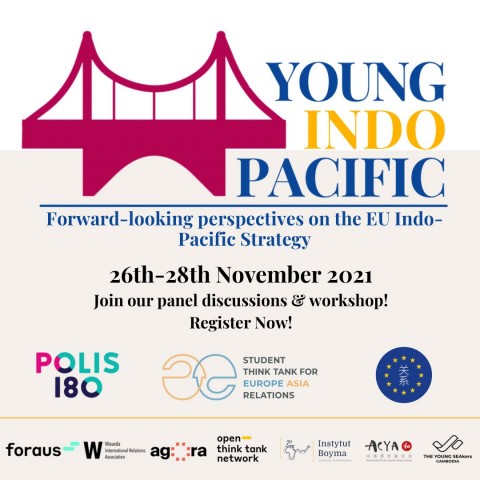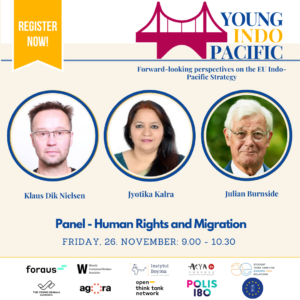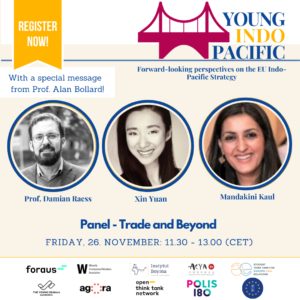
The Boym Institute, working with other think tanks, organizes panel discussions on topics related to the European Union’s Indo-Pacific strategy – Young Indo-Pacific: Forward-looking perspectives on the EU Indo-Pacific Strategy.
In this event, the three organizing think tanks – Polis180, European Guanxi and STEAR -, with support from Agora, Foraus, Boyma Institut, Australia China Youth Association, Waseda IR Association, The Young SEAkers and the Open ThinkTank Network, will host multiple panel discussions on topics regarding the European Union’s Indo-Pacific Strategy. If you want to know more about the EU Indo-Pacific Strategy make sure to read our introduction article.
The aim of the conference is to create a dialogue on the newly announced strategy of the European Union, to promote a broader understanding of the EU’s interactions with the Indo-Pacific region, and to look ahead at the direction in which key relationships between the EU and Indo-Pacific states and stakeholders will go. Moreover, we want to give students and young professionals from both regions a voice in international politics and foster a new platform for enhanced Asia-Europe cooperation.
Date and time of the panels:
Friday, 26. November:
9.00 -10.30 – Human Rights and Migration
- Jyotika Kalra (Member of the National Human Rights Commission of India)
- Julian Burnside (Australian Human Rights Lawyer and Activist)
- Klaus Dik Nielsen (Stakeholder Liaison, (Consultant), Office of the High Commissioner for Human Rights, Regional Office for South-East Asia (Migration and Human Rights)

10.30 – 11.30 – In conversation with Naoyuki Yoshino (Dean of the Asian Development Bank Institute, Professor emeritus of Keio University, Tokyo) – Financial collaboration between Europe and Indo-Pacific in regard to Green finance (30 minute presentation followed by Q&A)

11.30 – 13.00 – Trade and Beyond
- Xin Yuan (Representative to Europe at Shenzhen European Office)
- Prof. Damian Raess (SNSF Professor at the World Trade Institute)
- Mandakini Kaul (Senior Regional Cooperation Officer for South Asia at the World Bank in New Delhi)

20:00 – 20:45 – In conversation with Alan Bollard (Professor of Practice at the School of Government, Wellington School of Business and Government and chairman of the New Zealand Infrastructure Commission) (TBC)
Saturday, 27. November:
9.30 – 11.00 – Security and Geopolitics
- Prof. Harsh Pant (Professor of International Relations at King’s College London India Institute)
- Cristina de Esperanza Picardo (Joint PhD student at King’s College London and the National University of Singapore)
- Theresa Fallon (Founder and director of the Centre for Russia Europe Asia Studies and a member of the Council for Security Cooperation in the Asia-Pacific)

11.00 – 12.30 – Climate Change and Green Recovery
- Summer Chen (Climate Change Specialist at ERM, Former Head of Energy and Environment (East China) for the UK Foreign Commonwealth Office)
- Prof. Dhanasree Jayaram (Assistant Professor, Department of Geopolitics and International Relations, and Co-coordinator, Centre for Climate Studies, Manipal Academy of Higher Education (MAHE), Karnataka, India)
- Matthew MacGeoch (Transition Finance Analyst in the Market Intelligence Team at the Climate Bonds Initiative)

12.30 – 14.00 – Technology and Digitization
- Nigel Inkster (Senior Adviser for Cyber Security and China at the IISS and former assistant chief and director of operations and intelligence for the British Secret Intelligence Service)
- Prof. Stéphanie Balme (Dean of Sciences Po College, Professor at PSIA and Research Director at CERI)
- Sylwia Czubkowska (Journalist and a chief editor at the Polish service Spider’s Web)

14:00 – 15.00 – Networking Session
Sunday, 28. November:
11.00 – 14:00 – Workshop on drafting communique
The goal of the workshop is for participants to collect opinions and brainstorm ideas based on the issue areas discussed, culminating in a joint communique which will be issued by our organisations and presented to EU policymakers in December 2021/January 2022.
You can registrate for the event HERE.
czytaj więcej
Drug and Road Initiative, that is the Silk Road of drug
This paper deals with the issue of drug business in post-Soviet Central Asia, a region that plays a key role in the trafficking of banned substances from Asia (mainly Afghanistan) to Europe. The study briefly presents the areas that make up the picture of drug business in Central Asia, paying attention to production and distribution.
Jerzy OlędzkiPatrycja Pendrakowska made it to the Top 40 under 40 Europe-India leaders list
#EuropeIndia40, an initiative of EICBI, covers the stories of leaders below the age of 40 and their contributions to promoting EU India / UK India relations.
Charitable activities of the Vietnamese in Poland: their scope and sources
The scale of assistance provided to medics by the Vietnamese community during the 2020 pandemic inspires admiration and gratitude. It stems from the sense of belonging to Poland and deeply rooted in the culture order to help those in need and repay the debt incurred at the time when they themselves needed such help.
Ewa GrabowskaAn interview with Mr. Meirzhan Yussupov, Chairman of the Board of the “National Company” KAZAKH INVEST” JSC - Member of the Board of Directors of the Company
Magdalena Sobańska-CwalinaIndonesia – between religion and democracy
Indonesia is the largest Muslim democracy in the world. Approximately 88% of the population in Indonesia declares Islamic religion, but in spite of this significant dominance, Indonesia is not a religious state.
Anna GrzywaczPatrycja Pendrakowska as a founding member of the WICCI’s India-EU Business Council
By sharing knowledge, business opportunities, and best practices the Council generates awareness of women's contributions in developing the India-EU relations.
Global Gateway 101: A Short Guide to the EU’s Development Initiatives and their Challenges in Asia
The 2010s and 2020s have been marked by intense geopolitical competition, not only in traditional military and economic terms but also in the realm of global development initiatives.
Konrad SzattersNot only tests and masks: the history of Polish-Vietnamese mutual helpfulness
On the initiative of the Vietnamese community in Poland and Vietnamese graduates of Polish universities, our country received support from Vietnam - a country that deals with the threat posed by Sars-Cov-2 very effectively.
Grażyna Szymańska-MatusiewiczCoronavirus (COVID-19) outbreak and emerging contractual claims
With China one of the key players in the global supply chain, supplying major manufacturing companies with commodities, components and final products, the recent emerging outbreak of Coronavirus provides for a number of organizational as well as legal challenges.
Paweł Behrendt for 9DASHLINE: The South China Sea – from colonialism to the Cold War
We would like to inform, that 9DASHLINE has published article of Paweł Behrendt - the Boym Institute Analyst, in which he wrote about history of the South China Sea dispute over the 20th century.
Paweł BehrendtLiquidation of the Polish colony in Manchuria (north-eastern China)
Ms. Łucja Drabczak - A Polish woman born in Harbin, she spent her childhood in China. She returned to Poland at the age of 10. She is the author of the book 'China... Memories from my childhood'. She contacted us to convey special family memories related to leaving Manchuria in 1949.
Book review: “North Korea’s Cities”
Book review of "North Korea’s Cities", written by Rainer Dormels and published byJimoondang Publishing Company in 2014.
Nicolas LeviHow to deal with gender-based segregation?
Interview on the project Supporting the Economic Empowerment of Afghan Women through Education and Training in Kazakhstan and Uzbekistan. Magdalena Sobańska-Cwalina and Krzysztof M. Zalewski (The Boym Institute) in discussion with: Yakup Beris, Johannes Stenbaek Madsen, Maria Dotsenko, Gulnar Smailova,
Zespół Instytutu BoymaOpportunities and challenges of India’s G20 Presidency
Ada Dyndo conducts an interview with Shairee Malhotra on India’s role in G20. Shairee Malhotra serves as a Coordinator of the T20 India Taskforce on Reformed Multilateralism for India’s G20 presidency.
Ada DyndoThe Dasgupta Review on Women and the Environmental Crisis
Commissioned in 2019 by the British government and published in February 2021, The Dasgupta Review has been likened to the 2006 Stern Review. Where the latter brought to widespread attention the many failings of the world economy in the face of global warming, the former makes similar points as regards biodiversity – and identifies the unique challenges faced by women.
Dawid JuraszekFrom quantity to quality. Demographic transition in China – interview with Prof. Lauren Johnston
What we observe in China is a population reduction strategy paired with the socio-economic transition. In my view it’s not a crisis, but it is a very challenging transition.
Lauren JohnstonWomen’s liberation in China: interview with prof. Wu Lijuan
Interview of Ewelina Horoszkiewicz with prof. Wu Lijuan - Associate Professor at the Department of Sociology at Peking University. Her research concentrates on the gender issues and social changes brought about by globalization. She wrote a book “Job Placements and Job Shifts in China: The Effects of Education, Family Background and Gender”.
Ewelina HoroszkiewiczOnline Course: “Feminism and Democracy: a Deep Dive”
The course will be taught via interactive workshops, employing the Adam Institute’s signature “Betzavta – the Adam Institute’s Facilitation Method“, taught by its creator, Dr. Uki Maroshek-Klarman. The award-winning “Betzavta” method is rooted in an empirical approach to civic education, interpersonal communication and conflict resolution.
Book review: “Korean Diaspora in Postwar Japan – Geopolitics, Identity and Nation-Building”
Book review of "Korean Diaspora in Postwar Japan - Geopolitics, Identity and Nation-Building", written by Kim Myung-ja and published by I.B Tauris in 2017.
Nicolas LeviWomen in Public Debate – A Guide to Organising Inclusive and Meaningful Discussions
On the occasion of International Women's Day, we warmly invite you to read our guide to good practices: "Women in Public Debate – A Guide to Organising Inclusive and Meaningful Discussions."
Ada DyndoPatrycja Pendrakowska and Paweł Behrendt on navigating Sino-Polish relations
We are proud to annouce, that Patrycja Pendrakowska and Paweł Behrendt made a contribution to the latest project of the Baltic Security Foundation, The Jamestown Foundation and the Baltic-American Freedom Foundation.
San Zhong Zhanfa or Three Warfares. Chinese Hybrid Warfare
Cognitive operations are becoming an increasingly significant and common element of non-kinetic military operations. States and other political players deliberately manipulate the way their actions, those of their allies and those of their adversaries are perceived by the governments and societies of other international players.
Paweł BehrendtThe Boym Institute message to Indian policymakers and analysts
India’s current position towards the Russian invasion on Ukraine may damage its reputation as a major force of peace in the world
Are Polish Universities Really Victims of a Chinese Influence Campaign?
The Chinese Influence Campaign can allegedly play a dangerous role at certain Central European universities, as stated in the article ‘Countering China’s Influence Campaigns at European Universities’, (...) However, the text does ignore Poland, the country with the largest number of universities and students in the region. And we argue, the situation is much more complex.
Patrycja Pendrakowska
